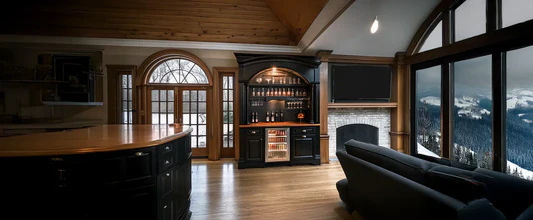As the weather gets colder and the holidays provide extra time off, winter is the perfect opportunity to tackle long-overdue projects in your garage or workshop. But without proper heating, it can be tough to get anything done. That’s where an electric heater can make all the difference.
This guide covers everything you need to know about heating your garage, barn, workshop, or shed for a comfortable and productive winter, plus key features to look for in a heater.
Why and How to Heat Your Garage or Workshop
Heating your garage or workshop transforms it into a comfortable, usable space year-round. Whether you’re working on cars, servicing equipment, pursuing hobbies, running a small business from home, or even working out, keeping it warm allows you to stay productive even in the coldest months. Heat can also protect paints, finishes, and other materials stored in your space from damage caused by freezing temperatures.
Compared to larger systems like radiant floor heating, propane heaters, or wood stoves, compact electric heaters are more affordable, easier to install, and safer in many situations. They require no special fuel or complicated setup, making them a simple and effective solution for cold-weather comfort.
The biggest advantage of compact electric heaters is their cost-effectiveness and convenience. Unlike more complex heating systems, they are less expensive to install and operate while posing fewer safety concerns. Systems like radiant floors or wood stoves often involve significant upfront costs, ongoing fuel supplies, and additional precautions. A compact electric heater delivers all the warmth you need without the hassle or expense.
Types of Different Heaters: Hardwired vs. Portable Heaters
Compact electric heaters for garages and workshops come in two main types: hardwired and portable. Hardwired heaters are professionally installed and permanently connected to your electrical system and panel. Though they are fixed in place, they can be adjusted to direct heat where it’s needed, and louvred vents help focus the warmth in your desired direction.
Portable heaters, on the other hand, are designed to be moved around and plugged into any nearby electrical outlet, as long as there are no flammable materials nearby. These heaters are ideal for providing targeted heat in different areas of a larger space or for taking with you to various outbuildings on your property.
Some portable models also offer the option to mount on the wall, providing more flexibility in how you position your heater. Instead of permanently hardwiring the unit, you can use the included mounting hardware to securely attach the heater to the wall, saving valuable floor space. This setup is particularly beneficial if you’re concerned about placing a floor heater near flammable materials like gas, paint, or solvents commonly found in a workshop or garage. It’s also a safer choice if you have children or pets running around your workspace, as mounting the heater keeps it out of the way, reducing the risk of accidental bumps or tip-overs.
>>>Related Resource: See how this customer uses the Newair Electric Garage Heater.
Key Features to Look For in a Heater for Your Workshop
When selecting a compact electric heater for your garage or workshop, look for these features.
Hardwired or Portable
Start by considering how you plan to use the heater and where you want to place it. Do you prefer a hardwired unit mounted near the ceiling, or would a portable, freestanding model that you can move around be more convenient?
Size of Your Garage or Workshop
Next, think about the size of the space you need to heat. Heaters typically list their BTU (British thermal units) output, but it's often more useful to check the square footage they can effectively heat. This will help you determine if the model provides enough warmth for your space.
For larger workshops, a hardwired heater might be necessary, as they tend to have higher heating capacities. However, some portable models now offer comparable output. If you're heating a smaller area, like the space under your workbench, a compact, under-desk heater could be all you need to stay comfortable.
Fan Operation
Many compact electric heaters feature a built-in fan to help circulate heat throughout the space, ensuring you stay warm no matter where you're working.
Output Settings
To maximize the effectiveness of your heater, choose a model with multiple heat settings. This feature allows you to easily adjust the temperature as conditions change, ensuring you stay comfortable whether it’s a chilly fall day or a frigid winter night. Additionally, having adjustable heat levels helps you optimize energy usage by providing the flexibility to use only as much power as necessary, which can lead to savings on your energy bills.
Safety Features
Some electric heaters are equipped with an automatic overheat or tip-over safety shut-off, a crucial safety feature that makes portable heaters even more reliable for garage use. This feature automatically shuts off the heater if it gets too hot or tips over, preventing the risk of fire or damage. It's especially important for busy environments where accidents can happen. By adding this layer of protection, you can enjoy peace of mind knowing the heater will stop functioning if it becomes a hazard, enhancing both safety and efficiency. This feature also extends the heater's lifespan, as it prevents overheating, ensuring it runs optimally for longer periods.
Cost
When it comes to cost, hardwired heaters generally tend to be more expensive than portable models. Hardwired heaters require professional installation, which adds to the overall cost, as they need to be connected directly to your electrical system and may require additional upgrades to your panel or wiring.
Portable heaters are generally more affordable upfront, as they don’t require installation and can be plugged into any standard outlet. While portable heaters can still be very effective, especially for smaller spaces, they often have lower heating capacities and may incur higher operating costs if used frequently over long periods. Ultimately, the initial cost difference depends on your specific heating needs, space size, and whether you prefer a one-time installation or a more flexible, movable solution.
Additional Features for Efficiency and Convenience
Depending on the model, you might also find these features useful:
- Extra-long cord for optimal placement
- Carry handle and cord wrap for easy transport
- Heavy-duty construction for tough environments
- 240-volt, 30-amp plug for commercial use (instead of a standard 120-volt)
- Remote control for easy operation
- Temperature display for precise comfort control
- Adjustable tilt head to direct heat where you need it most
Check Out Our Selection of Garage and Workshop Heaters
Don’t let the cold disrupt your projects or hobbies! Check out our selection of electric heaters designed to keep your garage comfortable no matter the season. Many are on sale right now, so you can stay warm while saving big!









